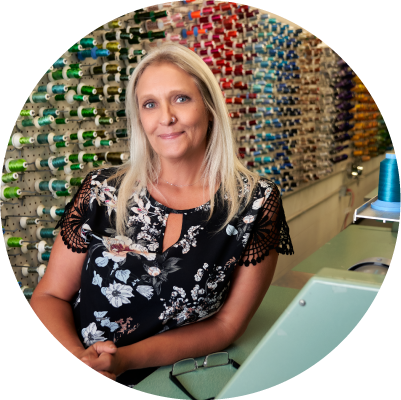Embroidery Business Pivots to Making PPE
By Mary Lee Harvey Dircks
Photo by Ron Coleman, C4 Photography
The effects of the pandemic ravaged many small businesses, and Austin Embroidery and Logos, Inc. could easily have been among the count. But Shannon Schmitz, Owner and Vice President, rose to the occasion—not only to save her business but to also produce much needed personal protective equipment (PPE) and provide jobs to people who found themselves with no or diminished income.
“We are resilient as a community. If I hadn’t stepped up, I’m sure somebody else would have,” Schmitz says. “As a community we can handle anything if we all stick together, like we did this past year.”
A large medical marketing firm that Schmitz worked with regularly requested her expertise to design patterns and produce medical-grade masks out of surgical blankets. She developed four different patterns that were shared with other contracted embroidery companies across Nebraska, Iowa and Kansas. “Iowa embroiderers used the first two designs,” she says. “They pumped those out. We did too. There were embroiderers contracted in Kansas that used my third design. And we used the fourth design, producing more than 51,000 masks here in my shop.” All combined, Schmitz estimates that millions of masks were produced using her patterns.
Major medical suppliers distributed these masks across all three states, including prisons and medical centers, where the demand was high and availability was low. “They were handing them out everywhere,” Schmitz says. “What was really cool is that everywhere I went I saw people wearing my masks. It was a really nice feeling.”
As events shut down and the economy halted in the spring of 2020, Schmitz took the advice of her banker to keep her employees on the payroll. “All of the major events I do work for were cancelled—College World Series, Berkshire Hathaway annual meeting, football, baseball—all of it. I would’ve gone out of business for sure,” Schmitz says. “We do hundreds of pieces for large marketing companies and small businesses; that’s our bread and butter. When they shut down the economy, we kind of just paused.” The masks saved the day.
“We became essential personnel, so we called our employees to come back into work and contracted with sewers and seamstresses all around town who were out of work,” Schmitz says. They employed 20 to 25 extra people in addition to their regular staff of 10. “We were able to provide them with masks to construct and complete and we were able to give them money so they wouldn’t starve.” She contracted with individuals who would take the fabric with the mask patterns sewn on home to cut. Then she’d sort and bundle the pieces for seamstresses to pick up. “They’d work on bundles of 100 or 300 for a few days, bring them back and take another bundle,” Schmitz says.
Austin Embroidery qualified for the Paycheck Protect Program (PPP), a business loan program established through the CARES Act to help small businesses pay their employees. “We were essential personnel, and we were able to prove that every single penny we got, we spent on employees—paying our people and paying our taxes,” Schmitz says. “None of that went into my pocket. That was just for the community, and it kept me in business.”
“Once we got done with that big contract, I don’t think any of us wanted to see another mask. We would wear them, but we just wanted to get back to helping our clients who were trying to make it through,” Schmitz says. “Our focus is always providing the best possible service to our clients.”
Schmitz and her mother, Rosalind Moyer, bought the business in 2003. Both enjoyed long careers with Northwestern Bell, which became US West Communications, Qwest, CenturyLink and now Lumin Technologies. “Our family was a phone company family,” Schmitz says, “on both sides.”
Moyer had retired from the phone company when the embroidery business came up for sale. She saw it as an opportunity and asked Schmitz to partner with her.
Stepping into retirement, Moyer brought decades of experience in management and public relations, while Schmitz brought expertise in fine arts and business with a Bachelor’s of Fine Arts from the University of Montana and a Master’s degree in Business from Ashford University in Iowa. “I figured out all of the digitizing stuff, turning artwork into stiches. There is not a program that will do that without a ton of mistakes,” Schmitz says. “One of the things that makes us different than other embroiderers is we are custom. You can walk in with an idea, we banter back and forth and we figure it out together.”
“We aren’t here to get rich; we are here to employ people and keep a nice traditional small business,” Schmitz says. And that’s exactly what they have done.

